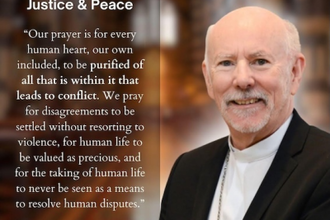Viewpoint: What is Justice and Peace?

Frank Campbell
Not too long ago a Catholic diocese advertised for a Justice and Peace worker. The job description referred to responsibility for the rights and well-being of disabled persons and also looked for some catechetical competence. It indicates the wide misunderstanding of the scope of J & P.
In thinking about this failure, I realised that there is a divide between what might be called pastoral work and a striving for more radical changes. Take health care provision as an analogy.
There is a broad division between para medics, first aiders, and emergency departments on one hand, where we react to illness and accident, and on the other hand community concern about the impact of heavy drinking, drug abuse, and childhood obesity. The first group we think of as reactive whilst the second we see as proactive.
It may be that pastoral work in the Church context encounters the same divide. We respond to crises and casualties in our communities with 'first aid' responses. The second category of needs, however, requires quite different analytical tools and treatments, and new strategies to remedy social and economic dysfunction. It will involve confronting social injustice. Take the example of the asylum issue. We offer clothing, food donations and secretarial support. Beyond that some people may try to exert direct influence on parliamentarians and the Border Agency. In general, parishioners are happier and more comfortable with the first aid option than with activism which has political roots.
Clearly the skills, empathy and competences needed to provide first aid (listening, empathy, some material resources) are different from what the political analysis requires (advocacy and a willingness to confront injustice in systems and structures and damage to people). Another way of seeing this divide is to see first aid as predominantly a process initiated by a helper with a place in society offered to someone who is disadvantaged or marginalised. Rescue or 'salvation' is coming from above from the helper. When we turn to the second mode of intervention, we see that change can only come about when the will and capacity exists for people to diet, take exercise, show self-restraint and self-respect. The process is sustained by those who want to change themselves. They will have been empowered to read the signs of the times in their own life experience. When the Latin American theologians spoke of 'a new way of being church' they had this process in mind.
Something of the same transition can be seen in CAFOD which began as an aid agency raising funds to alleviate poverty in the developing world. CAFOD has moved towards enabling workers to become self-sufficient. The whole concept of development moved from being what CAFOD and others can give to people in need in the global south, and became an equal partnership, enabling people to realise their own potential. This is a move from paternalist aid to self-empowerment.
There are implications in all this for a Church which hitherto has been hierarchically structured, paternalist with a controlling centralised power base and a clerical perspective on change. One wonders whether the Church hierarchy could see the significance of El Salvadorean theologian Jon Sobrino's point about salvation coming to us from the poor. If the transition I described has come about in various contexts, it is fair to ask whether the same transition could not be useful for the structures and mission of the Church herself. Bishop Crispian Hollis once said that the mind-set of privatised religion could be tolerated because it presented no threat or challenge in a post Christian society. A clerical, centralised and authoritarian Church leaves the laity disempowered. In this context, initiative is stifled and women are second class members.
If it is agreed that the current structures of the Catholic Church are failing the missionary task, then radical changes will be required with new objectives and priorities. The Church for too long refused to see the need for proper data or sociological analysis and the value of the human sciences. What seems to be promoted at present is meditation, spirituality, personal retreats and precisely the privatised religion Bishop Hollis saw as otiose.
What the faithful need is a liturgy which finds a focus in community needs and concerns, reverence for the planet, sustainability, work for peace, respect for human rights, work, and the economy. Such a church could indeed be rooted in gospel values and empowered to pray with conviction, 'Thy Kingdom Come'.
Frank Campbell is a Justice and Peace activist in Portsmouth Diocese.
NJPN Conference 20-22 July: www.justice-and-peace.org.uk/conference/


















